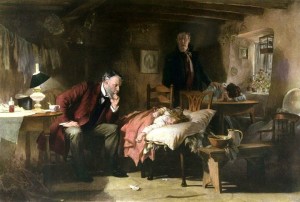One of life’s most tragic events is the death of child. Whether a child falls unexpectedly and hits his head or suffers from a disorder that progresses inevitably towards the premature end of a life – one cannot measure and compare such experiences.
We sometimes think of today’s biomedicine as an impersonal, corporate machine that prolongs the life of the terminally ill simply because it can. We criticize — I’ve criticized — maintaining the life of an elderly patient in an ultramodern ICU until she dies a lonely and undignified death. When the patient is a child, the decision to let go must be even more difficult for both family and physicians.
The Journal of the American Medical Association (JAMA) publishes a weekly feature where physicians (and others) can write about their more personal experience of medicine. In a recent essay, a doctor described how she was ready to let go of a young man’s life. The father was not. Eventually the doctor came to understand the father’s feelings.
 The patient, Jason (not his real name), had suffered from Wilms’ tumor or nephroblastoma, a malignant tumor of the kidneys that occurs primarily in children. It’s a rare disease: Only 500 cases are diagnosed in the US each year. Jason had made it through his first year of college, but blood clots from his heart had traveled to his brain. After a series of strokes, his cognitive function was minimal.
The patient, Jason (not his real name), had suffered from Wilms’ tumor or nephroblastoma, a malignant tumor of the kidneys that occurs primarily in children. It’s a rare disease: Only 500 cases are diagnosed in the US each year. Jason had made it through his first year of college, but blood clots from his heart had traveled to his brain. After a series of strokes, his cognitive function was minimal.
Dr. O’Brien, a surgeon, was consulted about performing a biopsy of Jason’s remaining kidney. She advised a less invasive procedure, given the child’s condition. “[B]ut I didn’t feel that was even indicated given Jason’s advanced disease. This was my recommendation as a surgeon, an objective bystander, an unemotional witness, and a stranger.”
Jason’s father, Gabe, was angry and upset, and his interactions with Dr. O’Brien were hostile. “He was a surly and angry man, surly with both the nurses and the physicians. … The nurses assigned to Jason’s care would often be reduced to tears by his father’s remarks or his critique of their care. … His son’s diagnosis made him so angry he was the most feared and despised parent on the unit.”
The physicians and nurses had given up on Jason, but Gabe demanded that his son be kept alive with intravenous feeding and a mechanical respirator. He refused to consider hospice care. Jason’s severe inflammation of the bladder worsened over the next few months, but his neurological condition improved to the point where he could feel pain.
Gabe never left his son’s room, sleeping and eating there. Dr. O’Brien writes: “I would see him in private moments embracing Jason, talking to him, kissing his cheek and stroking his brow – always maintaining contact with his son’s body, the body that I regarded as an empty shell and that Gabriel worshipped and loved.”
After a second operation for the bladder condition, Dr. O’Brien and Jason’s oncologist had a difficult conversation with both parents. The surgeon reported her findings: Jason’s disease was widespread. When Gabe asked what she would do next, she replied, “I’m not going to do any more surgery.” The oncologist agreed.
Gabe was furious.
“Doctor,” he said, “I’m not stupid. I know what’s left of Jason but all I want is him.” His voice broke and this hard man crumbled into sobs: “All I want is to have him. I want to hold my boy.”
I had been the object of this man’s rage for so long that I hadn’t realized that he saw in Jason’s dying form a beautiful, vibrant young man. A young man who had survived babyhood against all odds; a young man who was planning a degree in English and political science; a young man who had been so wretchedly torn from his parents’ embrace. Suddenly I understood and, despite all my training and conditioning to the contrary, I held Gabriel’s hand and we wept.
Related posts:
Baby Isaiah May, October 24, 2009 – March 11, 2010
Baby Isaiah: Ethical dilemmas of modern medicine (2)
Baby Isaiah: Ethical dilemmas of modern medicine (1)
Baby RB: Ethical dilemmas of modern medicine
Sources:
(Hover over book titles for more info. Links will open in a separate window or tab.)
Jeanne O’Brien, MD, Bodies and Spirit, JAMA Vol. 300 No. 20, November 26, 2008, 2348-2349.
A collection of essays from this JAMA column are featured in the book A Piece of My Mind.


Sorry, comments are closed for this post.